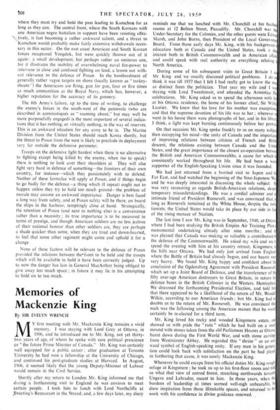Memories of Mackenzie King
By SIR EVELYN WRENCH
MY first meeting with Mr. Mackenzie King remains a vivid memory. I was staying with Lord Grey at Ottawa, in 1906, and he introduced me to Mr. King, not yet thirty- two years of age, of whom he spoke with rare political prescience as "the future Prime Minister of Canada." Mr. King was certainly well equipped for a public career ; after graduation at Toronto University he had won a fellowship at the University of Chicago, and continued his post-graduate studies at Harvard. In August, 1906, it seemed likely that the young Deputy-Minister of Labour would remain in the Civil Service.
Shortly after my return to London Mr. King informed me that during a forthcoming visit to England he was anxious to meet certain people. I took him to lunch with Lord Northcliffe at ,Sweeting's Restaurant in the Strand, and, a few days later, my diary
reminds me that we lunched with Mr. Churchill at his bade' rooms at 12 Bolton Street, Piccadilly. Mr. Churchill was t Under-Secretary for the Colonies, and the other guests were Edv, Marsh, and John Burns, then President of the Local Governme Board. From those early days Mr. King, with his background education both in Canada and the United States, took a d.. interest both in British Commonwealth and in American affai and could speak with real authority on everything relating North America.
During some of his subsequent visits to Great Britain I sa Mr. King and we usually discussed political problems. I do think it was till 1937 that I felt I had really got to know the ma as distinct from the politician. That year my wife and I w staying with Lord Tweedsmuir, and attended the Armistice Da celebrations. Mr. King asked us to spend the afternoon with If at his Ottawa residence, the home of his former chief, Sir Wilf Laurier. We knew that his love for his mother was exceptio and that the supreme devotion of his life was to her ; wherever x. went in his house there were photographs of her, and in his librarl I think, a light was kept burning continuously before her portra On that occasion Mr. King spoke frankly to us on many subj then occupying his mind—the unity of Canada and the importa of improving relations between citizens of French and Brit descent, the relations existing between Canada and the Unit. States, and the great importance of the closest co-operation betwee the British and American Commonwealths, a cause for which consistently worked throughout his life. He had been a wa supporter of the English-Speaking Union since it was founded.
We had just returned from a hurried visit to Japan and Far East, and had watched the beginning of the Sino-Japanese W. and he was deeply interested in discussing the whole subject. was very reassuring as regards British-American relations, desp temporary misundeislandings. He was a cordial admirer and intimate friend of President Roosevelt, and was convinced that, long as Roosevelt remained at the White House, despite the isol• tionists, the United States would take its place by our side in fa of the rising menace of Nazism.
The last time I saw Mr. King was in September, 1940, at Ottaw where I had been studying the British Empire Air Training Plan, monumental undertaking already after nine months ; and was pleased that Canada was making so valuable a contribution to the defence of the Commonwealth. He asked my wife and me to spend the evening with him at his country retreat, Kingsmere, is the hills near Ottawa. We had only just arrived from England, where the Battle of Britain had already begun, and our hearts were very heavy. We found Mr. King happy and confident about tlx conclusion of the Ogdensburg Agreement with President Roosevelt which set up a Joint Board of Defence, and the transference of t fifty over-age American destroyers to Great Britain, in return for defence bases in the British Colonies in the Western Hemisphere. We discussed the forthcoming Presidential Election, and told him that there appeared to be a likelihood of the return of Mr. Wendel Wilkie, according to our American friends ; but Mr. King had no doubts as to the return of Mr. Roosevelt. He was convinced that such was the following among the American masses that he would certainly be re-elected for a third term.
Mr. King loved his rocky and wooded Kingsmere estate, and showed us with pride the " ruin " which he had built on a small mound with stones taken from the old Parliament Houses at Ottawa, burnt down during the First World War, and with stone carvings from Westminster Abbey. He regarded this " shrine " as an out ward symbol of English-speaking unity. If any man in his genera• tion could look back with satisfaction on the part he had played in furthering that cause, it was surely Mackenzie King.
Whenever he could escape from his official duties Mr. King sought refuge at Kingsmere ; he took us up to his first-floor room and told us what that view of untrod forest, stretching northwards towards Ungava and Labrador, meant to him. In those years, when the burdens of leadership at times seemed well-nigh unbearable, he drew inspiration from those illimitable spaces, and returned to his work with his confidence in divine guidance renewed.


































 Previous page
Previous page